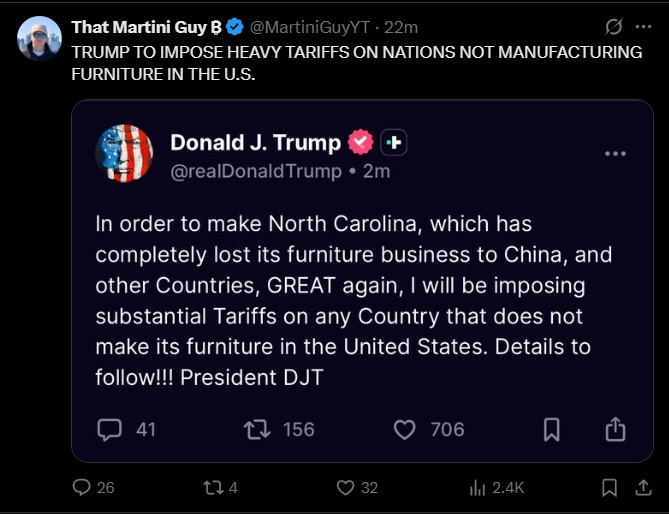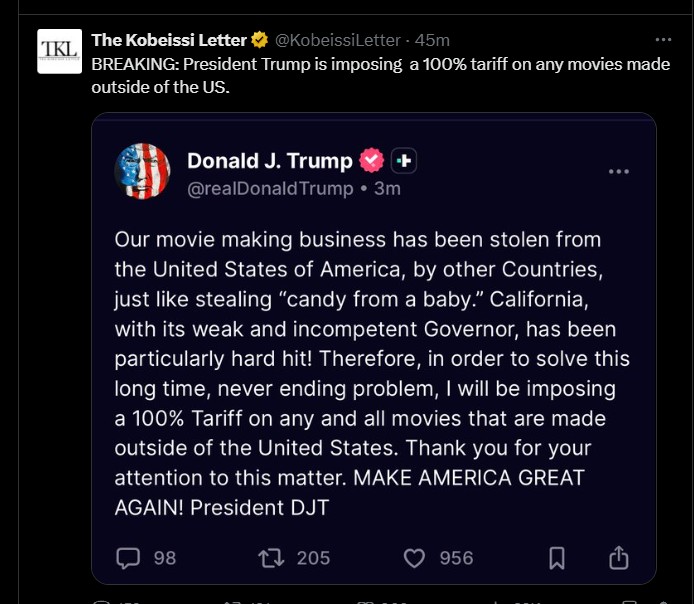New Trump Tariffs To Revive US Furniture & Films: Jobs or Higher Cost?
Former President Donald Trump has announced plans to impose substantial tariffs on furniture and movies produced outside the United States. The move, part of his broader New Trump Tariffs strategy, seeks to revive domestic industries but could spark major global trade disputes.
Trump Targets Furniture Industry
Trump’s first announcement came through a tweet addressing North Carolina, once a leading hub for U.S. furniture production. According to the Richmond Fed’s 2025 analysis, the state lost over 50% of its furniture jobs between 1999 and 2009, largely due to Chinese imports.
Trump stated:
“To make North Carolina, which has completely lost its furniture business to China and other countries, GREAT again, I will be imposing substantial tariffs on any country that does not make its furniture in the United States.”

Source: The Martini Guy X
This proposal aligns with his second-term tariff agenda. By April 2025, U.S. average tariff rates had already surged from 2.5% to 27%, the highest in over a century, according to Wikipedia’s 2025 trade data.
Trump Tariffs Announcement on Movie Industries
In a separate announcement, Trump declared a 100% tariff on all foreign-made movies, arguing that America’s film industry has been “stolen” by international competitors. He criticized California’s leadership, claiming weak policies had left Hollywood vulnerable.
His Words:
“Our movie-making business has been stolen from the United States of America, by other Countries, just like stealing ‘candy from a baby.’ … I will be imposing a 100% Tariff on any movies made outside of the United States.”

Source: The Kobeissi Letter X
Economic and Cultural Impacts
Furniture Industry: Although some companies like Norwalk Furniture still produce U.S.-made products, American manufacturers face steep competition from low-cost Asian imports. Tariffs can level the playing field, but they are likely to increase consumer prices.
Film Industry: The Australian Institute of International Affairs (2025) reported that the U.S. film industry is making close to $20 billion a year in exports. Analysts fear that tariffs will reduce this by as much as 30%, hurting Hollywood's dominance in the world market.
A 2023 study at the University of Southern California reported that 65% of movies in the U.S. currently include foreign shoots. The tariff plan proposed might bring the production home, yet critics believe that it might raise the costs by 15-20%, according to a 2022 analysis by the RAND Corporation.
Criticism and Concerns
Those who oppose the heavy tariff policies argue that they would be productive. Although the tariffs are meant to safeguard U.S. jobs, they may lead to trade wars, increased production expenses, and a lack of competitiveness.
The movie industry in California is already experiencing a 10% reduction in jobs since 2020, and could further aggravate the employment situation.
On the furnitures side, consumers may pay more since the manufacturers in the U.S. will not be able to satisfy the demand at reasonable prices. Economists caution that tariff hardly ever ensure job revival in sectors that are being lost to globalization.
Conclusion
The proposals on foreign-made furnitures and movies by Trump underscore his continued efforts to transform the U.S. trade policy. As it seeks to revive domestic industries, the strategy will create increased costs, trade conflicts, and unforeseen effects on workers and consumers. However, Trump tariffs generated $30B revenue , the highest ever in US trade history
免责声明:本文章仅代表作者个人观点,不代表本平台的立场和观点。本文章仅供信息分享,不构成对任何人的任何投资建议。用户与作者之间的任何争议,与本平台无关。如网页中刊载的文章或图片涉及侵权,请提供相关的权利证明和身份证明发送邮件到support@aicoin.com,本平台相关工作人员将会进行核查。




